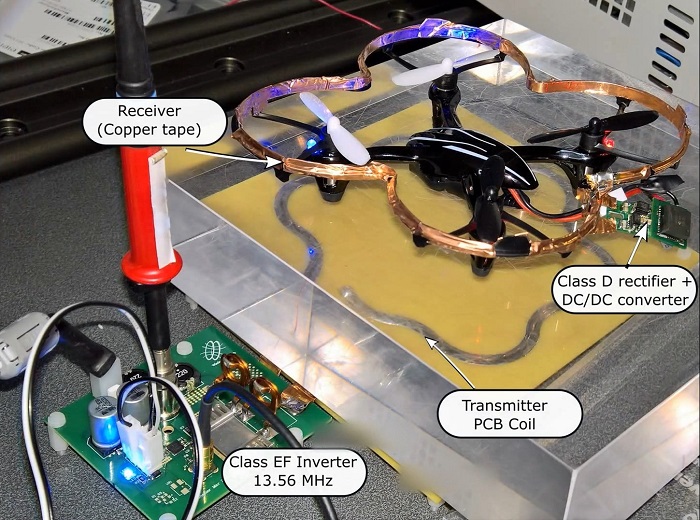The videos above are proof-of-concept clips that show a quadrotor being wirelessly powered via magnetic induction; that is, the tiny aircraft is completely and totally without an on-board power reserve.

Dr. Samer Aldhaher of the Imperial College London created the lightweight device, and he details his approach in the published paper, Design and Development of a Class EF Inverter and Rectifier for Multimegahertz Wireless Power Transfer Systems.
In short, the drone’s transmitter was implemented on a two-layer PCB and driven by a load independent Class EF inverter. The latter component operates at 13.56 MHz and uses just one GaN transistor from GaN Systems. This was an interesting decision to make as most power-transfer technologies use kilohertz instead of megahertz; however, in going this route, Dr. Aldhaher was able to use smaller and lighter components which are, obviously, key to designing a miniature drone.
The receiving coil is made up of a single turn of copper tape wound around the shield of the quadrotor. The receiver board, meanwhile, consists of a Class D rectifier and a DC/DC converter.
All told, enough power is generated and wirelessly transferred to the drone to enable continuous flight.

Wires would obviously allow for higher power and higher frequency, but the ability to transmit a few watts across thin air is exciting nonetheless. For those curious, in order for the drone to fly across a room, extensive infrastructure and construction would be necessary.
At the end of the day, five inches above a power base with minimal side-to-side movement is about as good as this technology will get — but it still makes for a pretty impressive proof-of-concept demonstration.
Via Hackaday
Advertisement
Learn more about Electronic Products Magazine





